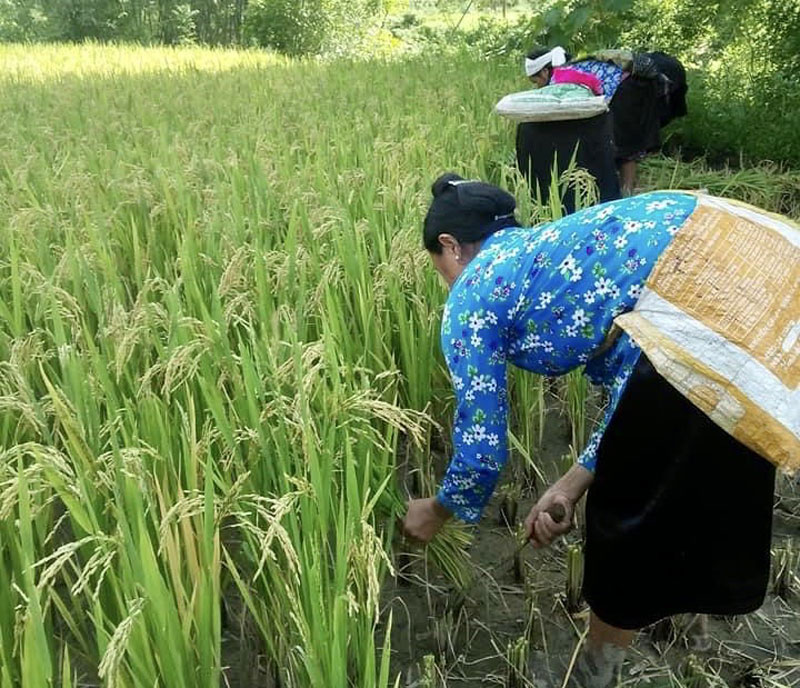
(HBO) – The mountainous district of Da Bac is now in the harvest time of the spring rice crop. Since this crop, farmers in the communes of Muong Chieng, Dong Chum, Doan Ket and Tan Pheo have gained more momentum as J02, the local rice speciality, was given the collective trademark certificate.
 Farmers in Nhap hamlet of Dong Chum commune (Da Bac district) harvest
the J02 spring rice crop, which generates 6 tonnes of paddy per ha.
Farmers in Nhap hamlet of Dong Chum commune (Da Bac district) harvest
the J02 spring rice crop, which generates 6 tonnes of paddy per ha.
The variety has been grown on a trial basis in
Da Bac since 2015. Muong Chieng commune was the first locality to cultivate
this Japanese-origin variety, which was imported and selected by the
Agricultural Genetics Institute.
Right in the first crop, this variety showed
outstanding strengths. In particular, though it is grown in various areas
nationwide like Phu Tho, Hai Duong and Hai Phong, the J02 rice in Da Bac tastes
much better than the one farmed in other localities, which is attributable to
the local mountainous terrain that creates high day-night temperature
difference – an ideal condition for the J02 variety that prefers cold weather.
J02 is currently cultivated on a large scale in
the communes of Dong Chum (15ha), Muong Chieng (40ha), Tan Pheo (10ha), Giap Dat
(10ha), and Doan Ket (25ha), with the annual farming area of over 250ha and an
output of 6 tonnes per ha each crop.
In 2020, the Da Bac Farmers’ Union has provided
the right to use the collective trademark for 11 farming households and
production and business establishments in the district.
Consumers now can recognise the J02 rice of Da
Bac via its specific package and logo. Local authorities are also stepping up
advertising and expanding the distribution network for the speciality,
including groceries, rice stores, traditional markets, and minimarts in densely
populated areas in Hoa Binh province and Hanoi.
A recent survey showed that consumers have
certain preference for the J02 rice of Da Bac. Up to 52.5 percent of the
respondents in Hoa Binh city said they use this kind of rice. In Hanoi, this
was also the opinion of 68 percent of the consumers interviewed in Hoang Mai
district, 56 percent in Ha Dong district, 66 percent in Dong Da district, and
82 percent in Hai Ba Trung district./.
In Lac Thuy district, communes have been succeeded in promoting their One Commune-One Product (OCOP) products while others are still struggling to position their typical farming products in market. Some communes in the district still fail to have their products met OCOP programme’s requirements, while others have seen their certifications expired.
The inspectorate agency of Hoa Binh province has issued Official Dispatch No. 1090/TTr-PCTN to provincial departments, agencies, localities, business associations, enterprises, and investors regarding measures to improve informal component indexes of the Provincial Competitiveness Index (PCI).
Hoa Binh is taking concrete steps to improve its investment environment, with a strong focus on supporting businesses, settling obstacles for strategic investors, and creating opportunities for robust development in the coming years.
Under the blazing early summer sun, the construction site of Nhuan Trach Industrial Park (IP) in Luong Son district is abuzz with activities from dawn to dusk, a testament to the determination of the investor to meet their construction targets on schedule.



 Farmers in Nhap hamlet of Dong Chum commune (Da Bac district) harvest
the J02 spring rice crop, which generates 6 tonnes of paddy per ha.
Farmers in Nhap hamlet of Dong Chum commune (Da Bac district) harvest
the J02 spring rice crop, which generates 6 tonnes of paddy per ha.